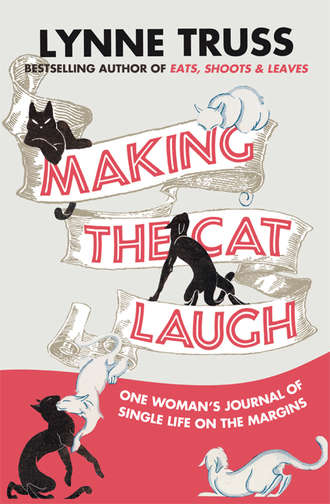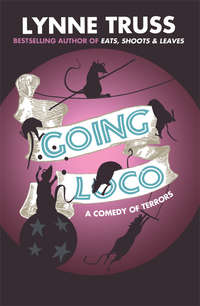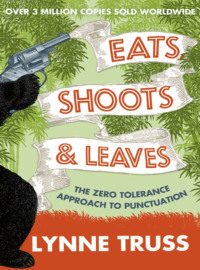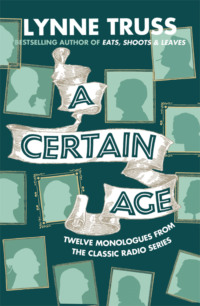
Полная версия
Making the Cat Laugh

I went to see Batman Returns last week. A man-friend had dropped the offhand remark that the Michelle Pfeiffer character had reminded him of me, so naturally I couldn’t wait to find out what he meant. After all, Michelle Pfeiffer and I are seldom mentioned in the same breath; and on the evidence of the publicity shots of Catwoman – the sexy patent leather catsuit, the high heels, whip, and hood with little black ears – I have to admit I was chuffed and flattered.
As I stood in the ticket queue at Leicester Square I preened myself by licking the back of my hand and rubbing my forehead with it. I flexed my painted claws. Meeeeow, I thought. How perceptive of this male acquaintance to realize that while I portray myself in this column as a frowzy, spinsterish stay-at-home, in reality I am a lithe, crazy, dangerous feline-type animal who prowls the moonlit rooftops after dark, purring to the sounds of the night-time city.
But alas, no sooner was I embarked on my second vat of popcorn than I noticed that the Michelle Pfeiffer character in Batman Returns is a frowzy, spinsterish stay-at-home, instantly recognizable as Single Life material at its most abject and pitiable. Damn. Her name is Selina. Each evening she bursts into her apartment with a ritualistic shout of ‘Honey, I’m home!’ followed by ‘Oh I forgot, I’m not married.’ She kicks off her shoes, listens to the answering machine, pours milk for the cat, talks aimlessly to herself. Evidently it was Selina, not Catwoman, that my friend had been talking about. I put my head in my popcorn tub for a moment, and screamed with the minimum disruption.
No wonder Selina escapes this paltry existence by assuming the identity of Catwoman (‘I am Catwoman, hear me roar’). It is a sensible decision. The only problem is that, before it can happen, she must suffer a brutal death from defenestration – which gives pause to all the would-be Catwomen in the audience who are fed up with shouting ‘Honey, I’m home’ to an empty flat. I mean, is it worth chucking yourself off the Shell building on the remote chance it might turn you into Catwoman? Well, it’s tricky. I am still weighing it up.
But if it boils down to clothes, I am sunk. You see, in order to become Catwoman it is important that you can rummage in your wardrobe for an old patent leather coat; you then rip its seams and magically re-fashion it into the appropriate figure-hugging costume. Imagine your disappointment, then, if having flung yourself from a high roof (and become a glassy-eyed un-dead) you opened your closet, snapping your expectant pinking shears, to find only a brown calf-length fun-fur, with no patent leather in sight. You would have to become Teddywoman instead, and it would not be the same.
‘I am Teddywoman, hear me not make any aggressive noise,’ you would say lamely, as you sat with your arms out in front of you, unable to bend your elbows. It would be dreadful. While chaos overtook your city, you would just sit there looking stiff and fluffy and hoping that your eyeballs didn’t fall out. There would be no opportunity for Batman to fall in love with you during exciting bouts of single combat, either. At best, he might pick you up by the ear and trail you on the ground behind him. And admit it, this would make you feel quite stupid.
I don’t suppose Batman’s creators needed to think very hard about the animal identity of his female counterpart. Dogwoman would not draw much male interest. Spiderwoman has been done before. Elephantwoman would look like a rip-off. And Ferretwoman is too suggestive. So Catwoman was the obvious answer. However, lots of potential kitty-joke plot-devices were disappointingly left untapped by Batman Returns. For example, just as Batman is summoned across Gotham City by a special Bat-design searchlight shone on to solid cloud, couldn’t Catwoman have been summoned from miles distant by the shaking of a little box of Miaow-mix?
I liked Batman Returns. The one thing that really worried me, though, was the role of the Gotham City populace, who are required repeatedly to turn up in grey hats and coats for Yuletide speeches outside the City Hall. Each time they do this, a dastardly attack is launched against them, entailing multiple explosions, car chases, punch-ups and deaths. At one point, this passive crowd is sprayed with machine-gun fire from a trick umbrella. So why on earth do they keep turning out, these people? Imagine, if you lived in Gotham City, and somebody said ‘Are you coming to hear the new mayor address us this evening?’, wouldn’t you pause momentarily before limping off to another apocalyptic pasting? A twinge of pain from your latest shrapnel wounds would surely nudge your decision one way or the other.
I suppose one should not be surprised. Only a city of fools relies on a man in a bat-costume to protect it from evil. But perhaps the Gothamites deliberately expose themselves to extreme danger in the hope that they will be transformed, like Michelle Pfeiffer, into a new superhuman chimera. In which case, you have to admire their pluck. The only trouble is, you can’t imagine a movie called Lemmingman, can you?

The bit that always stops me dead is where it says ‘Photo appreciated’. Up to then I am fine, almost excited. I can even entertain the pathetic notion that I am being singled out personally.
‘Intellectual Andre Agassi look alike with steady job’ (it says) ‘seeks lonely cat-fixated Teddywoman for evenings of mutual squeaks. Extensive knowledge of EastEnders an advantage. My dream lady has clean TV licence, an interest in the fashion potential of household fluff, and a Jeff Bridges video collection. Please write to Box 213. Oh, and I nearly forgot. Photo appreciated.’
‘Damn,’ I yell, and head-butt the bath-taps. Bleeding from the brow, I stab wildly at the Lonely Hearts column, speechless with frustration. There he is! Mister Dreamboat himself! But he wants a photo! And now we can never meet because I don’t have any pictures. What a personal disaster. ‘Perhaps you could send your Single Life picture?’ ventures a passing cat, sort-of telepathically. ‘Hah!’ I shout. ‘How can I send a newspaper clipping, you fur-faced poltroon! Besides, this picture gives most people the impression I am 93!’
I clamber from the bath, press a towel to my head, and go through the usual frantic motions of searching the flat for a suitable picture. But while I rifle my home with all the gusto of the professional burglar, I know there is no chance whatever of success. In the end, in desperation, I grab my passport and some pinking shears and tussle with the temptation to cut out the picture forthwith. But luckily I remember in the nick of time that a) it was taken seven years ago; and b) some of the proffered squeaking might take place abroad.
Sinking on the debris, I sob quietly. If I say I always look lousy in photographs, there is one large, obvious inference which I would naturally rather not contemplate. But there is another reason, honestly, for my despondence. It is that I find it really hard to pose. In front of a camera I just smile in a ‘this is it, there’s no more’ kind of way, and trust that ‘being myself’ will do the job. This is utterly wrong-headed, of course, because for a successful photo you must seize the moment, choose your statement, and go for it. Whereas I invariably look as though the statement I have chosen is ‘I am simple-minded. Please don’t mind me. Children are safe.’
For this reason, book jackets depress me. I am amazed by the intensely serious faces adopted by authors on the backs of books. It is as though they have been subjected to some weird voodoo practice, where all the personality and humour has been pulled out in strings through their nostrils. Look at the pictures of the Booker shortlist people (the men, anyway) and you will see they seem to have memorized a list of permitted authorial qualities – a list that is unfortunately rather short. It goes: Brainy, Moody, Mad, Sincere, Sensitive, Anxious, Supercilious, Dangerous, Grumpy. On this list, you will observe, Harmless is notable by its absence.
Evidently authors may choose three (not more) of these qualities and put them together in subtle combinations. Thus, taking a random selection from the bookshelves, one finds that the Ian McEwan of Black Dogs, say, has opted for brainy, anxious and mad; that Martin Amis, formerly brainy, supercilious and dangerous (London Fields), has now daringly regrouped as brainy, sincere and anxious (Time’s Arrow). And Nigel Williams (They Came from sw19) has achieved an amazing triple – of brainily sensitive, sincerely sensitive and sensitively grumpy.
For women the range is smaller and doesn’t include Brainy. That’s just the way it is. Traditionally women could choose from Clever, Nice, Shiny, Well Made-up and Pet-owning, but usually said to hell with it and took the lot. To this list a few new elements have been added recently. For example, Jeanette Winterson (famously self-effacing author of Written on the Body) has added Challenging, Bloody-Minded and Eyes that Follow You Around the Room. Pictures of women authors sometimes have a verge-of-tears quality, reminiscent of Julia Margaret Cameron’s famous picture Despair, which was achieved by locking the juvenile sitter in a cupboard for a couple of hours beforehand. Jeanette Winterson does not look like someone recently emerged from a cupboard. She does, however, resemble a person who has just locked someone else in a cupboard, and put the key down the lav.
Meanwhile, what do I do about the Andre Agassi man? If I don’t send a picture, he will smell a rat. Perhaps I should get a heap of coins and take residence in a Photo-Me booth for the afternoon, trying out statements. Think moody. Think mad. Think grumpy. But what I don’t understand is this. Given that the mad, brainy, sincere look is only a pretence, why not go for something a bit more dramatic? Such as Livid, Amnesiac, Paranoid, or Escaping from Wolves? Unfortunately I shall have to settle for Concussed by Bathroom Appliance. Which probably means that my photo won’t be appreciated very much, after all.

A man friend who lives in California recently phoned me at great expense from a Santa Barbara call-box and asked me what clothes I had on. Not having read any fashionable American novels about sex-by-phone, I found this rather unsettling. It came out of the blue. I mean, we observed the usual preliminary greetings, such as ‘What time is it where you are?’ and ‘Have you seen The Player yet, isn’t it great?’ But we had barely touched on the elections and the earthquake forecasts before he posed this extraordinary question about my attire, leaving me all perplexed and wrong-footed.
Was this a dirty phone-call, I thought, or was he simply concerned to conjure up an innocent mental picture of his faraway pal? Should I give him the benefit of the doubt? Playing for time (and angling for clues) I asked what he was wearing, but his answer didn’t help. Evidently his outfit consisted of a T-shirt and trousers, some trainers and a beany hat. ‘Sounds very nice,’ I said non-committally, wondering whether the beany hat was a code for something. Either way, I was still completely in the dark about whether to confess to the old grey army socks and the jumbo dungarees.
Fran Lebowitz once said that the telephone is a good way to talk to people without having to offer them a drink. Personally, I see it as a good way of talking to people without having to dress up in a high-cut Kim Basinger costume, or apologize for your paltry wardrobe of seductive gear. In the end, I decided to ignore the overtones, and acted dumb. I said that actually my clothes were so thickly matted with cat-hair and household fluff that I could no longer identify them with any confidence. A smart evasion, which seemed to do the trick, because the subject turned to the Richter scale forthwith.
I was more disturbed by this conversation than it really merited, perhaps. But I hold the telephone in reverence as an instrument of pure verbal communication, and I don’t like to see it messed about. Surely this is the only form of talk in which you can convince yourself that the other person is really engaged in a flow of words entirely undistracted by the extraneous. Which is precisely why it always comes as a shock to discover that for the past ten minutes the other person has been keeping an eye on Northern Exposure, or marking exams, fitting a new flea-collar on a resistant pet, or reading a funny bit from Tristram Shandy.
Saying ‘Have I caught you at a bad time?’ does not eliminate this problem, I find.
YOU: Have I caught you at a bad time?
THEM: No, not at all. How are things? (Tap, tap, tap.)
YOU: Are you sure you’re not busy?
THEM: (Tap, tap, tap.) What?
YOU: Listen, I’ll phone another time.
THEM: No, really. This is lovely. (Tap, tap, tap.)
YOU: Look, are you typing, or something?
THEM: Just the radio play. (Tap, tap, tap.) The one about existential despair. (Tap, tap, tap.) I’m doing this big speech about the black void of silence and the sensation (tap, tap, tap) that nobody is listening, anywhere in the universe (tap, tap, tap) to anyone else. I don’t mind if you want to talk, though. (Tap, tap, tap.) It doesn’t bother me.
YOU: I’m surprised you can write and talk at the same time.
THEM: Perhaps you’re right. I’ll stop for a while. (Clank, clatter, tinkle.)
YOU: What’s that?
THEM: Nothing much. I thought I’d start dinner.
The worst thing is when they don’t mention they have guests. You chatter away for twenty minutes or so, and then hear them whisper, ‘Go ahead without me. I think she just needed someone to talk to. Sorry.’ That’s the other illusion of the telephone, of course: that the other person is on their own, just as you are. There is a woman I know who answers the phone in your presence and signals at you to wait; and then she talks animatedly for thirty minutes without giving a single indication to the person on the other end that there is any reason not to. Meanwhile she pulls faces at you, mimes ‘nearly finished’ repeatedly, and makes exaggerated comic pleading gestures when you make embarrassed efforts to leave. Imagine how awkward one feels phoning her up, after witnessing all that.
Perhaps I worried too much about my American friend’s innocent question. He only asked what I was wearing, after all. He didn’t ask if I was entertaining a coach party from the Midlands, or examining A-levels, or making a casserole; whereas in fact I was doing all three, as well as finishing my script for the epic Night of the Living Teddywomen and practising bird-calls.
Funny he didn’t remark on the array of sound effects, really – Shsh, tick, chop, tap, cuckoo – (something like a jaunty clock repair shop in a Disney cartoon). But then perhaps he was simply transported by the unbearably erotic notion of a woman, six thousand miles away, dressed up to resemble the inside of a Hoover bag.

When you are a single person, the world is full of happy couples. That’s the idea, anyway; the tragic little myth we have all picked up from somewhere. In this version of events, life is a couples-only ceilidh in which the single person is the perpetual wallflower; she leans over the bridge in St James’s Park in her lonely anorak, crooning the plaintive country song from Starlight Express (‘I’ve been U-n-c-o-u-p-l-e-d’), while happy newlyweds chuck beach-balls about, and giggle together at the ducks.
This is all rubbish, of course. It rubs no salt in my wound to see people happily paired off; they could waltz around the concourse at Waterloo in their dozens, and I wouldn’t care. No, what single life means to me (strangely enough) is that I can’t stand to hear couples bickering about where to park the car; or stalking off in a huff at the supermarket. It seems terrible. The other day I saw a man in the street trying repeatedly to take his wife’s hand, and she kept snatching it away again. It made my blood run cold, like watching somebody kick a dog.
I wonder whether people parade their marital misery because they are proud of it. At traffic lights, you can always see couples in cars staring out in different directions with their mouths set rectangular like letter-boxes, and with a small thundercloud visible above their heads. You will have noticed also how those cheerful ‘Bob and Sandy’ windscreen stickers have largely disappeared, which is something I take personal credit for. I kept knocking on the glass and saying, ‘Hey, cheer up, Bob, you’ve got Sandy,’ and ‘Cheer up, Sandy, you’ve got Bob,’ until they took the stupid things down and cut them in half.
So if I tend to avoid dinner parties, it is not because I am afraid the couples will canoodle in front of me, but because the couplesome strangers Derek and Jo need only exchange a private hostile glance over the sage derby and I start to panic on their behalf. It is not happy, this Derek-and-Jo; it will split up; its Derek-and-Jo kiddies will suffer. I turn into a kind of Cassandra, prophesying the sooner-or-later catastrophe of Derek-and-Jo with a forlorn certainty, usually even before they have reached the front gate and started arguing.
It is a heavy burden: to see the inevitable with such clarity. ‘See the cracks!’ I moan inwardly (after some ritual ‘who’s driving?’ fracas after pudding). ‘Oh, woe! Hear the marital fabric split and rend, stitch by stitch verily from top to bottom! Weep, ye marrieds! Weep!’ It is an odd way to behave in a Crouch End dining room, but of course nobody listens anyway. Or if they do, they probably put it down to personal disappointment.
This fatalism seems to be the worst aspect of being single; it gives you a cranky view of the world. You have heard of ex-hippies who advocate trepanning as the answer to everything (drill a hole in your skull to let off steam)? Well, I am quite similar, only I think everyone must tear up the marriage lines or sell the double bed, or for heaven’s sake quit moaning. As you can imagine, this makes me pretty useless as an adviser when relationships hit stormy seas, since my suggestions are always equally radical and precisely the same.
‘I think he’s seeing another woman, but I can’t believe it’s true,’ sobs a friend, desperate for support. ‘Split up,’ I advise, promptly, ‘and make sure you get the tumble drier.’ ‘I am in such turmoil,’ says another. ‘My wife wants to have a baby and the idea makes me dream about being eaten alive by a big hairy mouth with teeth in it.’ ‘Mmm,’ I say thoughtfully. ‘Have you considered going your separate ways?’ On Radio 4’s comedy news programme On the Hour the other day, I heard: ‘A palace spokesman has today confirmed that Prince Harry is to split up,’ and I automatically thought ‘Good idea; best thing’ before seeing the joke.
The thing is, coupledom is a bit like childbirth; a week after it’s finished, you can’t imagine what it was like, or how you got into it. This is the gulf between single people and couples, and between the different bits of one’s own life. One minute you are Derek-and-Jo; the next you are Derek or Jo. And in each state you can’t imagine the other. I have spent about 80 per cent of my adult life in proper committed long-term relationships, yet at the moment all I can clearly remember is that I once startled my boyfriend by asking, out of the blue: ‘Why aren’t you a pony?’
This ‘Why don’t they split up?’ syndrome is not sour grapes, I promise. It is not even cynicism. It is just an unanswerable point of view, similar to a religious conviction. The only trouble with this particular panacea (like trepanning) is that once you have done it, you can’t do it again. Consequently its evangelists cannot follow their own advice. What do trepanners do when they are depressed? If they kept drilling holes in their heads, they would risk being mistaken for patio strawberry-planters.
Similarly, once you have split up you can’t keep doing it, unless of course you are a simple organism like an amoeba. So it is quite ironic, really. Here I am, advocating the new revolutionary pluck-it-out, cut-and-run approach to personal happiness, while at home I am gradually learning how to patch things up.

One of the more difficult things to accept about being newly single is that there is no one to strike chore-bargains with. You know the sort of thing: ‘If you do the breakfast, I’ll take the bin out’; ‘I’ll get the milk, you get the papers.’ Make such fair’s-fair suggestions to a cat, I find, and it will just look preoccupied, and suddenly remember an urgent appointment outside.
The beauty of efficient teamwork is that it cuts through the grease and grime of household activity with a brisk one-two, reminiscent of the old telly adverts for Flash. Wisshh, woossshh, all done. ‘You make a cup of tea, while I lie full-out on this sofa, preventing it from bucking up and killing somebody.’
Jobs that can’t be tackled simultaneously stretch out instead in long miserable single file, like prisoners on a chain-gang, and are dealt with on the weary principle of one-damn-thing-after-another. The plodding linear quality is depressing. Sometimes you forget, of course, and glance optimistically at the bin, fleetingly wondering whether someone else has taken out the rubbish. But they usually have not. The cheerful midnight pixie with bucket and mop is a sweet and potent myth, but it is cruelly misleading.
Looking on the bright side, however, there is great consolation in the knowledge that the Mr Nobody who takes out the bin is also the Mr Nobody who moves things around so that you can’t find them. Take the TV remote control, for example. In my old cohabiting days, how many times did I search frantically among sofa cushions for it, knowing in my heavy heart that it was probably travelling anti-clockwise on the M25 by now, snug in a coat pocket on the back seat of the boyfriend’s car? Living alone, then, it is no wonder you rejoice that things remain precisely where you left them. You feel a great warmth inside on the day you realize that if you haven’t finished the marmalade, there is still some marmalade left. The only interference I have experienced since living alone was when I emerged from the bath one day to discover the word ‘trhjwqxz’ on my otherwise blank word-processor screen. I gulped, and stood stock still for a minute, feeling the pulse race in my neck. And then I realized that a cat had made a dash across the keyboard.
I mention all this because last week I left a friend alone in my flat for a couple of hours, and when I came back I realized I could retrace virtually every moment of his stay, just by observing all the things he had moved from their usual places. The loo seat was up. A plate with toast crumbs awaited me on the draining-board, along with a knife tinged with Marmite. A couple of inches of wine had gone from an opened bottle, and a glass with dregs in it was rolling on the living-room floor. A book had been replaced in the wrong position on a shelf, a window opened (and not closed again), the backdoor key hidden so successfully it took me two hours to find it. I moved stealthily around the flat, feeling a bit like Sherlock Holmes on the trail of exotic cigar-ash. ‘He’s been here, too!’ I whispered excitedly. ‘See, he has moved these cassettes!’ Thank goodness I didn’t have a magnifying-glass, or I would have been down on the carpet, observing the pile for footprints.
I felt proud and irritated in equal measure: proud that I can now (like Holmes himself) detect the tiniest variation in the depth of dust on a pile of Radio Times; irritated for obvious reasons (mainly to do with washing up). But there was something rather macabre about this Do Your Own Forensics activity, and eventually I stopped thinking about it. The idea of living alone is somehow quite closely associated with the idea of dying alone, too; and I didn’t want to think about the giveaway clues packed into my own day-to-day life. ‘We found a half-eaten jar of pickled onions next to the bath. She had fed the cats but not washed the spoon. A little Post-It note was attached to the bin, with the mysterious words ‘‘I suppose it’s my turn again?’’ written on it in big wobbly capital letters, underlined.’







